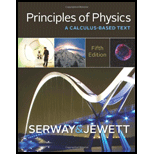
(a)
The final velocity of the person and the cart.
(a)
Answer to Problem 49P
The final velocity of the person and the cart is
Explanation of Solution
Write the expression for conservation of momentum for inelastic collision.
Here,
Conclusion:
Substitute
In vector notation the velocity of the cart and person is,
Therefore, the final velocity of the person and the cart is
(b)
The friction force acting on the person.
(b)
Answer to Problem 49P
The friction force acting on the person is
Explanation of Solution
Write the expression for normal force by using Newton’s second law in y direction
Here,
Write the expression for frictional force exerted on the person.
Here,
Conclusion:
Substitute
Substitute
In vector notation the frictional force is,
Therefore, the friction force acting on the person is
(c)
The time taken for the frictional force acting on the person.
(c)
Answer to Problem 49P
The time taken for the frictional force acting on the person is
Explanation of Solution
Write the expression for person’s momentum equal to the impulse.
Here,
Write the expression for initial momentum.
Here,
Write the expression for final momentum.
Here,
Write the expression for impulse.
Here,
Conclusion:
Substitute the equations (V), (VI) and (VII) in equation (IV).
Substitute
Therefore, the time taken for the frictional force acting on the person is
(d)
The change in momentum of the person and the cart.
(d)
Answer to Problem 49P
The change in momentum of the person is
Explanation of Solution
Write the expression for change in momentum of the person.
Write the expression for change in momentum of the cart.
Conclusion:
Substitute
Substitute
Therefore, the change in momentum of the person is
(e)
The displacement of the person relative to the ground.
(e)
Answer to Problem 49P
The displacement of the person relative to the ground is
Explanation of Solution
Write the expression for displacement of the person relative to the ground.
Here,
Conclusion:
Substitute
Therefore, the displacement of the person relative to the ground is
(f)
The displacement of the cart relative to the ground.
(f)
Answer to Problem 49P
The displacement of the cart relative to the ground is
Explanation of Solution
Write the expression for displacement of the cart relative to the ground.
Conclusion:
Substitute
Therefore, the displacement of the cart relative to the ground is
(g)
The change in kinetic energy of the person.
(g)
Answer to Problem 49P
The change in kinetic energy of the person is
Explanation of Solution
Write the expression for change in kinetic energy of the person.
Conclusion:
Substitute
Therefore, the change in kinetic energy of the person is
(h)
The change in kinetic energy of the cart.
(h)
Answer to Problem 49P
The change in kinetic energy of the cart is
Explanation of Solution
Write the expression for change in kinetic energy of the cart.
Conclusion:
Substitute
Therefore, the change in kinetic energy of the cart is
(i)
Why the answers part (g) and (h) are differ.
(i)
Answer to Problem 49P
Because. the distance moved by the cart is different from the distance moved by the point of application of friction force to the cart.
Explanation of Solution
The force exerted by the person on the cart must be equal in magnitude and opposite in direction to the force exerted by the cart on the person. The changes in momentum of the two objects must be equal in magnitude and must be added to zero.
The change in kinetic energy is different in magnitude and does not add to zero.
Conclusion:
The following situation is represents in two ways,
The distance moved by the cart is different from the distance moved by the point of application of friction force to the cart.
The total change in mechanical energy for both objects add together becomes zero, it is perfectly in elastic collision.
Want to see more full solutions like this?
Chapter 8 Solutions
Bundle: Principles of Physics: A Calculus-Based Text, 5th + WebAssign Printed Access Card for Serway/Jewett's Principles of Physics: A Calculus-Based Text, 5th Edition, Multi-Term
- Mick and Rick are twins born on Earth in the year 2175. Rick grows up to be an Earth-bound robotics technician while Mick becomes an intergalactic astronaut. Mick leaves the Earth on his first space mission in the year 2200 and travels, according to his clock, for 10 years at a speed of 0.75c. Unfortunately, at this point in his journey, the structure of his ship undergoes mechanical breakdown and the ship explodes. How old is Rick when his brother dies?arrow_forwardHi, I have canceled, why did you charge me again?arrow_forwardNo chatgpt pls will upvotearrow_forward
 Principles of Physics: A Calculus-Based TextPhysicsISBN:9781133104261Author:Raymond A. Serway, John W. JewettPublisher:Cengage Learning
Principles of Physics: A Calculus-Based TextPhysicsISBN:9781133104261Author:Raymond A. Serway, John W. JewettPublisher:Cengage Learning Physics for Scientists and Engineers: Foundations...PhysicsISBN:9781133939146Author:Katz, Debora M.Publisher:Cengage Learning
Physics for Scientists and Engineers: Foundations...PhysicsISBN:9781133939146Author:Katz, Debora M.Publisher:Cengage Learning Physics for Scientists and Engineers with Modern ...PhysicsISBN:9781337553292Author:Raymond A. Serway, John W. JewettPublisher:Cengage Learning
Physics for Scientists and Engineers with Modern ...PhysicsISBN:9781337553292Author:Raymond A. Serway, John W. JewettPublisher:Cengage Learning Physics for Scientists and EngineersPhysicsISBN:9781337553278Author:Raymond A. Serway, John W. JewettPublisher:Cengage Learning
Physics for Scientists and EngineersPhysicsISBN:9781337553278Author:Raymond A. Serway, John W. JewettPublisher:Cengage Learning University Physics Volume 1PhysicsISBN:9781938168277Author:William Moebs, Samuel J. Ling, Jeff SannyPublisher:OpenStax - Rice University
University Physics Volume 1PhysicsISBN:9781938168277Author:William Moebs, Samuel J. Ling, Jeff SannyPublisher:OpenStax - Rice University Physics for Scientists and Engineers, Technology ...PhysicsISBN:9781305116399Author:Raymond A. Serway, John W. JewettPublisher:Cengage Learning
Physics for Scientists and Engineers, Technology ...PhysicsISBN:9781305116399Author:Raymond A. Serway, John W. JewettPublisher:Cengage Learning





